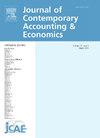CPA exam score and auditors’ salaries
IF 2.9
3区 管理学
Q2 BUSINESS, FINANCE
引用次数: 0
Abstract
The research presents two competing views on the welfare effects of occupational licensing. One stream of literature suggests that licensing is a barrier to entry into professions, limiting competition and resulting in economic rents. A second stream suggests that they can increase well-being by alleviating information problems. We use data on CPAs’ salaries before and after certification to test these conflicting hypotheses. Consistent with the information-alleviation hypothesis, we find a positive correlation between performance on the CPA exam and auditors’ salaries after the exam but not before the exam when the competencies have developed. Furthermore, we find that the positive association is stronger for auditors working at Big 4 firms, younger auditors and male auditors. The abovementioned results indicate that auditors’ technical competencies are valued more highly by Big 4 firms than by non-Big 4 firms. After the CPA certification, we do not observe salary increases that are greater than expected based on previous years’ increases and auditors’ performance on the CPA exam, as the barrier-to-entry theoretical approach suggests. We discuss the implications of the results for the role of CPA regulation.
注册会计师考试成绩和审计师工资
该研究对职业许可的福利效应提出了两种相互竞争的观点。一种文献表明,许可是进入行业的障碍,限制了竞争,导致了经济租金。第二种观点认为,它们可以通过缓解信息问题来提高幸福感。我们使用注册会计师认证前后的工资数据来检验这些相互矛盾的假设。与信息缓解假设一致,我们发现注册会计师考试成绩与考试后审计师的工资呈正相关,而当能力发展时,考试前审计师的工资与考试成绩呈正相关。此外,我们发现在四大会计师事务所工作的审计师、年轻审计师和男性审计师之间的正相关关系更强。上述结果表明,四大会计师事务所比非四大会计师事务所更重视审计师的技术能力。在注册会计师认证之后,我们没有观察到根据前几年的加薪和审计师在注册会计师考试中的表现,加薪幅度大于预期,正如进入壁垒理论方法所表明的那样。我们讨论了结果对注册会计师监管作用的影响。
本文章由计算机程序翻译,如有差异,请以英文原文为准。
求助全文
约1分钟内获得全文
求助全文

 求助内容:
求助内容: 应助结果提醒方式:
应助结果提醒方式:


